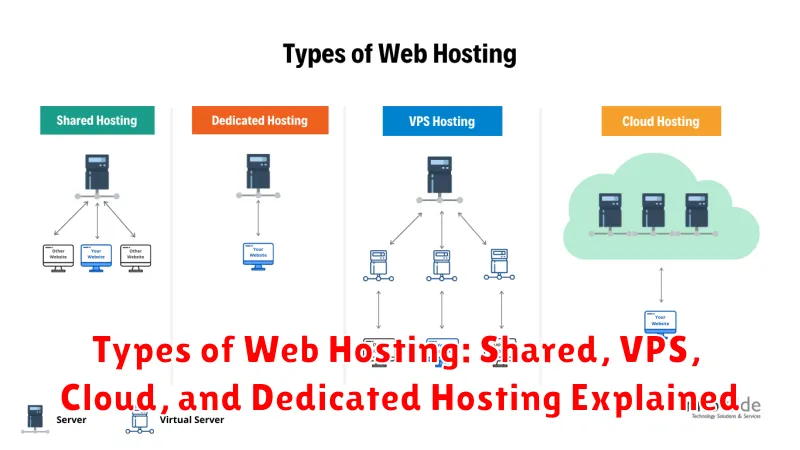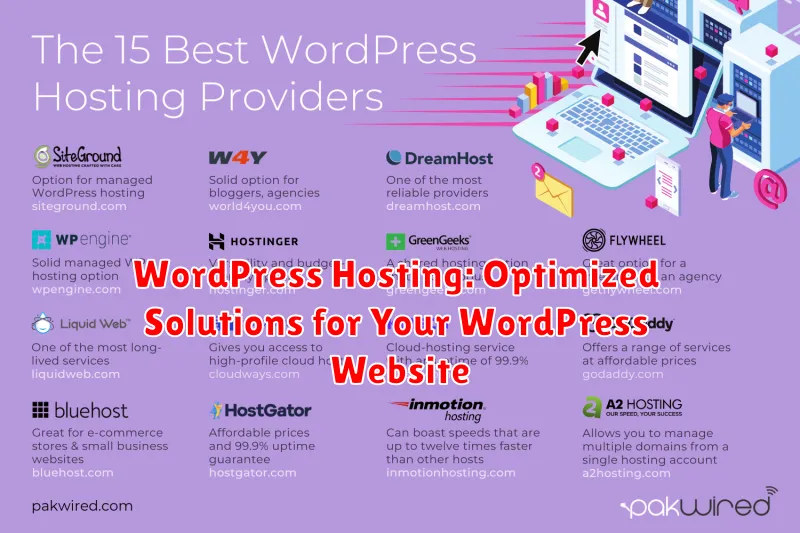In the ever-evolving digital landscape, a reliable and robust web hosting service is paramount for any website or online business. With countless providers vying for your attention, choosing the right one can feel overwhelming. This comprehensive guide will equip you with the knowledge and insights needed to navigate the complex world of web hosting, empowering you to make an informed decision for 2024 and beyond.
From understanding different hosting types to evaluating crucial factors like uptime, speed, security, and customer support, this ultimate guide will cover everything you need to know. We’ll explore the best hosting solutions for diverse needs, including shared hosting, VPS hosting, dedicated servers, and cloud hosting. By the end of this article, you’ll be confident in selecting the perfect web hosting service to power your online presence and achieve your digital goals.
Understanding Your Needs: What to Look for in a Web Hosting Service
Before diving into the technical details of web hosting, it’s crucial to understand your website’s specific needs. This will help you choose a plan that meets your requirements and avoids unnecessary expenses.
Start by asking yourself these key questions:
- What type of website are you building? Is it a simple personal blog, a complex e-commerce platform, or a resource-intensive website with lots of multimedia content?
- How much traffic do you anticipate? Consider your target audience and potential growth.
- What features are essential? Do you need a database, email accounts, SSL certificates, or specific security features?
- What is your budget? Hosting plans vary widely in price, so determine your financial limits.
Once you have a clear understanding of your needs, you can start researching and comparing different web hosting providers. This will help you narrow down your options and find the best fit for your website.
Types of Web Hosting: Shared, VPS, Cloud, and Dedicated Hosting Explained

Choosing the right web hosting service is crucial for any website. The type of hosting you select will impact your website’s performance, security, and scalability. There are various types of web hosting available, each with its own benefits and drawbacks. Here’s a comprehensive guide to four popular types of web hosting: Shared, VPS, Cloud, and Dedicated Hosting.
Shared Hosting
Shared hosting is the most affordable option, where multiple websites share the same server resources. This means your website shares CPU, RAM, and storage with other websites on the same server. Shared hosting is a good choice for small businesses, personal websites, or blogs with low traffic.
- Pros: Budget-friendly, easy to set up, good for low-traffic websites.
- Cons: Limited resources, performance can be impacted by other websites on the server, less security.
VPS Hosting
VPS (Virtual Private Server) hosting offers a more powerful solution than shared hosting. With VPS hosting, you get a virtualized portion of a physical server, providing you with dedicated resources and more control over your server environment. VPS is a good choice for websites with moderate traffic, e-commerce stores, or applications requiring more resources.
- Pros: More resources and control than shared hosting, improved performance, better security.
- Cons: More expensive than shared hosting, requires more technical expertise.
Cloud Hosting
Cloud hosting distributes your website across multiple servers in a network. This provides high scalability, flexibility, and redundancy. If one server fails, your website remains operational on other servers. Cloud hosting is a good choice for websites with high traffic, demanding applications, or those requiring high availability.
- Pros: Scalability, high availability, flexibility, pay-as-you-go pricing.
- Cons: Can be more expensive than other options, requires understanding of cloud concepts.
Dedicated Hosting
Dedicated hosting provides you with an entire physical server dedicated solely to your website. This offers the highest level of resources, control, and security. Dedicated hosting is the best choice for large businesses, high-traffic websites, or applications requiring maximum performance and security.
- Pros: Maximum resources and control, high performance, enhanced security.
- Cons: Most expensive option, requires significant technical expertise.
Choosing the Right Hosting Service
The best web hosting service for you depends on your specific needs and budget. Consider factors like:
- Traffic volume: How many visitors do you expect to your website?
- Resource requirements: What are the resource needs of your website or application?
- Security concerns: What security measures are necessary for your website?
- Budget: How much are you willing to spend on web hosting?
By understanding the different types of web hosting and your website’s requirements, you can make an informed decision and choose the right hosting service for your online success.
Key Features to Consider: Uptime, Speed, Security, and Support
Choosing the right web hosting service is crucial for the success of any website. In 2024, there are more options than ever, making it challenging to navigate the vast landscape of hosting providers. To make an informed decision, it’s essential to prioritize key features that directly impact your website’s performance, security, and user experience. Let’s explore four critical factors: uptime, speed, security, and support.
Uptime refers to the percentage of time your website is accessible to visitors. A high uptime is vital, ensuring minimal downtime and a smooth user experience. Aim for a provider with a guaranteed uptime of at least 99.9%. Look for their track record and any service level agreements (SLAs) that guarantee compensation for downtime.
Speed is equally important. A fast-loading website keeps visitors engaged and improves user satisfaction. Slow loading times can lead to high bounce rates and lost conversions. Choose a hosting provider that offers fast servers and uses technologies like caching to optimize website speed. Consider factors like server location and the type of hosting (shared, VPS, dedicated) to ensure optimal performance.
Security is paramount in today’s digital world. A compromised website can lead to data breaches, financial losses, and reputational damage. Choose a hosting provider with robust security features like firewalls, malware scanning, and regular security updates. Look for certifications like SSL/TLS for secure data transmission and investigate their data backup and recovery policies.
Support is crucial, especially for website owners who might not have technical expertise. Look for a provider with 24/7 customer support through various channels like live chat, email, and phone. Consider the responsiveness of their support team and their ability to address issues promptly. Evaluate their knowledge base, documentation, and community forums for self-service resources.
Top Web Hosting Providers of 2024: A Comprehensive Comparison
In the digital age, having a reliable and efficient web hosting service is crucial for any website. With countless providers vying for your attention, choosing the right one can feel overwhelming. This comprehensive guide will delve into the top web hosting providers of 2024, comparing their strengths, weaknesses, and pricing to help you make an informed decision.
Here are some of the top contenders for the best web hosting services in 2024:
1. Bluehost
Bluehost is a popular choice for beginners and established websites alike. They offer a wide range of hosting plans, including shared, VPS, dedicated, and WordPress hosting. Known for their user-friendly interface and 24/7 customer support, Bluehost is a reliable option for those seeking value for money.
2. HostGator
HostGator is another reputable provider known for its affordable prices and robust features. They offer a wide selection of hosting plans, including shared, cloud, VPS, and dedicated hosting. HostGator’s customer support is highly regarded, making it a good choice for those seeking assistance when needed.
3. GoDaddy
GoDaddy is a global leader in web hosting and domain registration. They offer a comprehensive suite of services, including shared, VPS, dedicated, and WordPress hosting. GoDaddy’s extensive features and reputation make it a strong contender for businesses seeking a reliable and feature-rich platform.
4. SiteGround
SiteGround is known for its exceptional performance and speed. They offer a variety of hosting plans, including shared, cloud, VPS, and dedicated hosting. SiteGround’s focus on speed and security makes it an ideal choice for websites that require high performance and reliability.
5. DreamHost
DreamHost is a reputable provider known for its commitment to sustainability and ethical practices. They offer a range of hosting plans, including shared, VPS, dedicated, and WordPress hosting. DreamHost’s reliable infrastructure and excellent customer support make it a solid option for businesses seeking a responsible and trustworthy partner.
Choosing the right web hosting provider depends on your specific needs and budget. Consider the following factors when making your decision:
* Hosting Type: Shared, VPS, dedicated, cloud, or WordPress hosting? * Storage Space and Bandwidth: How much storage and bandwidth do you need? * Price and Features: What features are essential, and what’s your budget? * Customer Support: How responsive is their customer support? * Security: What security measures are in place?
By carefully evaluating these factors and considering the strengths and weaknesses of each provider, you can choose the best web hosting service to power your online presence in 2024.
Budget-Friendly Options: Best Web Hosting for Small Businesses and Startups

Starting a small business or a startup can be exciting, but it’s also expensive. Choosing the right web hosting service is crucial for your online presence, and it doesn’t have to break the bank. These budget-friendly options offer great value for small businesses and startups:
HostGator
HostGator is known for its affordable shared hosting plans and its user-friendly interface. They offer a variety of features, including unlimited bandwidth, disk space, and email accounts. They also provide excellent customer support, making them a great choice for beginners.
Bluehost
Bluehost is another popular choice for small businesses and startups. They offer a range of hosting plans, including shared, VPS, and dedicated servers. Their plans come with a free domain name and website builder, making it easy to get started with your online presence. Bluehost also provides a generous money-back guarantee.
Namecheap
Namecheap is known for its low-cost domain registration and hosting services. They offer a variety of affordable hosting plans, including shared, VPS, and cloud hosting. They also provide excellent customer support and a wide range of features. Namecheap is a great option for small businesses and startups looking for value and reliability.
GoDaddy
GoDaddy is one of the largest web hosting providers in the world. They offer a wide range of plans and features, including shared, VPS, and dedicated servers. GoDaddy is a good choice for small businesses and startups that need a reliable and scalable hosting solution.
Remember to carefully consider your specific needs and budget when choosing a web hosting service. These budget-friendly options can help you get your business online without breaking the bank.
E-commerce Hosting: Choosing the Right Plan for Your Online Store
Launching an online store requires a solid foundation, and that foundation is your web hosting. Choosing the right e-commerce hosting plan is crucial for the success of your business. This guide will delve into the key considerations to help you select the perfect hosting solution for your needs.
Understanding E-commerce Hosting: E-commerce hosting is specifically designed for online stores, offering features tailored to handle high traffic, secure transactions, and the demands of selling products online. It typically includes features like:
- Security Measures: SSL certificates, firewalls, and malware protection to safeguard customer data and transactions.
- Performance Optimization: Faster loading speeds, caching mechanisms, and optimized server configurations for a smooth user experience.
- Scalability: The ability to easily handle growing traffic and sales volumes without compromising performance.
- E-commerce Integrations: Compatibility with popular shopping carts, payment gateways, and other essential e-commerce tools.
Factors to Consider When Choosing E-commerce Hosting:
- Traffic Volume: Estimate your expected website traffic to ensure your hosting plan can handle it.
- Storage Space: Consider the size of your product images, videos, and other website content.
- Bandwidth: Ensure enough bandwidth to accommodate large file downloads and streaming media.
- Security Needs: Evaluate the security features offered by different hosting providers.
- Support and Customer Service: Look for a provider with excellent customer support available 24/7.
Types of E-commerce Hosting:
- Shared Hosting: Affordable, but resources are shared with other websites, potentially affecting performance.
- VPS Hosting: Provides more control and resources, ideal for growing stores.
- Dedicated Hosting: The most powerful option, offering exclusive server resources for ultimate performance and security.
- Cloud Hosting: Scalable and flexible, using a network of servers for reliability and performance.
Choosing the Right Plan:
- Start Small: Begin with a shared hosting plan if you’re just starting and scale up as needed.
- Consider Future Growth: Choose a hosting plan that can accommodate your projected growth.
- Prioritize Security: Select a provider with robust security measures to protect your business and customers.
Final Thoughts: Choosing the right e-commerce hosting plan is essential for your online store’s success. Carefully analyze your needs, budget, and future goals before making a decision. Invest in a hosting solution that supports your growth and provides a secure and reliable platform for your online business.
WordPress Hosting: Optimized Solutions for Your WordPress Website

Choosing the right web hosting service is crucial for any website, but it’s especially important for WordPress sites. WordPress is a powerful and popular platform, but it also requires specific resources to perform optimally. This means you need a hosting provider that’s specifically designed to handle the demands of a WordPress website.
Fortunately, there are numerous WordPress hosting options available, each with its unique features and benefits. These options are optimized for WordPress, offering features like:
- Faster loading times: Optimized servers, caching plugins, and other features ensure a smooth user experience.
- Enhanced security: WordPress-specific security measures protect your website from threats like malware and hacking.
- Automatic updates: Keep your WordPress core, themes, and plugins up-to-date for optimal performance and security.
- Expert support: Access dedicated support teams specializing in WordPress to resolve any issues quickly.
When choosing WordPress hosting, consider factors such as:
- Traffic volume: Choose a plan that can handle your expected website traffic.
- Storage and bandwidth: Ensure your hosting plan provides enough storage for your website files and sufficient bandwidth for smooth data transfer.
- Price: Compare prices and features to find the most value for your money.
- Features: Look for features like automatic backups, SSL certificates, and other essentials for a secure and optimized website.
By carefully considering these factors and exploring the various options available, you can find the perfect WordPress hosting solution to power your website and achieve success online.
Managed Hosting: Hassle-Free Web Hosting for Businesses

In the competitive world of online presence, businesses need a reliable and efficient web hosting solution. While there are numerous options available, managed hosting stands out as a compelling choice for organizations seeking a hassle-free experience. Managed hosting offers a comprehensive package that includes not only server space but also expert technical support, security measures, and performance optimization. This article will delve into the benefits of managed hosting and why it’s an ideal solution for businesses of all sizes.
One of the most significant advantages of managed hosting is the expert technical support. Managed hosting providers employ dedicated teams of professionals who handle all aspects of server administration. This includes tasks such as server maintenance, software updates, security patching, and troubleshooting. Businesses can focus on their core operations, confident that their website is in capable hands.
Another key benefit of managed hosting is enhanced security. Managed hosting providers implement stringent security measures to protect websites from threats such as malware, DDoS attacks, and unauthorized access. This includes firewalls, intrusion detection systems, and regular security audits. Businesses can rest assured that their website and sensitive data are well protected.
Managed hosting also prioritizes performance optimization. Providers employ techniques such as server caching, content delivery networks (CDNs), and load balancing to ensure that websites load quickly and efficiently. This is crucial for a positive user experience and improved search engine rankings.
Furthermore, managed hosting offers scalability. As businesses grow, their website needs may change. Managed hosting providers offer flexible plans that can be scaled up or down to meet evolving requirements. This eliminates the need for businesses to worry about outgrowing their hosting plan or investing in excessive resources.
In conclusion, managed hosting provides a comprehensive and hassle-free solution for businesses looking to establish a robust online presence. With expert technical support, enhanced security, performance optimization, and scalability, managed hosting empowers businesses to focus on their core competencies while ensuring a reliable and efficient website experience.
Green Web Hosting: Eco-Friendly Options for Sustainable Websites
In today’s environmentally conscious world, it’s important to consider the impact of our digital footprint. Websites, while essential, contribute to carbon emissions through data centers that power them. This is where green web hosting comes in, offering an eco-friendly alternative for sustainable websites.
Green web hosting providers prioritize sustainability by using renewable energy sources, energy-efficient servers, and carbon offsetting programs. By choosing a green host, you can reduce your website’s carbon footprint and contribute to a greener internet.
Here’s why opting for green web hosting is a smart decision for 2024 and beyond:
- Reduced Environmental Impact: Green web hosting minimizes carbon emissions, lessening the strain on our planet.
- Ethical Choice: Supporting green hosting aligns with your commitment to sustainable practices.
- Positive Brand Image: Showcasing your commitment to sustainability can attract eco-conscious customers.
- Growing Trend: The demand for green web hosting is on the rise, making it a future-proof choice.
When choosing a green web host, look for providers that are transparent about their sustainability efforts. Ensure they use renewable energy sources, invest in energy-efficient hardware, and participate in carbon offsetting programs.
Making the switch to green web hosting is a simple yet impactful step towards a more sustainable future for the internet. By choosing green options, we can all contribute to a greener and more responsible digital world.
The Future of Web Hosting: Trends and Predictions for 2024 and Beyond

The web hosting landscape is constantly evolving, driven by technological advancements, changing user demands, and emerging trends. As we move into 2024 and beyond, several key trends are poised to shape the future of web hosting. These trends will impact how websites are built, hosted, and accessed, offering both challenges and opportunities for businesses and individuals alike.
Edge Computing is expected to gain further momentum, bringing processing power closer to users and reducing latency. This will be crucial for delivering fast and seamless experiences for users accessing websites and applications from geographically dispersed locations.
Serverless Computing, where code runs in response to events without the need for server management, will continue to grow in popularity. This trend allows developers to focus on building applications rather than managing infrastructure, leading to greater agility and cost efficiency.
Artificial Intelligence (AI) and Machine Learning (ML) will play an increasingly significant role in web hosting. AI-powered tools will help optimize website performance, improve security, and automate various tasks, further enhancing user experiences.
Sustainability is becoming a core consideration in the tech industry. Web hosting providers will need to adopt more environmentally friendly practices, such as using renewable energy sources and implementing energy-efficient technologies.
The rise of Web 3.0, with its focus on decentralized applications and blockchain technology, will present new challenges and opportunities for web hosting. Decentralized hosting platforms and services will emerge, offering alternative hosting options for blockchain-based applications.
In conclusion, the future of web hosting is full of exciting possibilities. As technology continues to advance and user expectations evolve, web hosting providers will need to adapt and innovate to meet the demands of a rapidly changing digital landscape. Staying informed about these trends and embracing new technologies will be key to success in the years to come.

